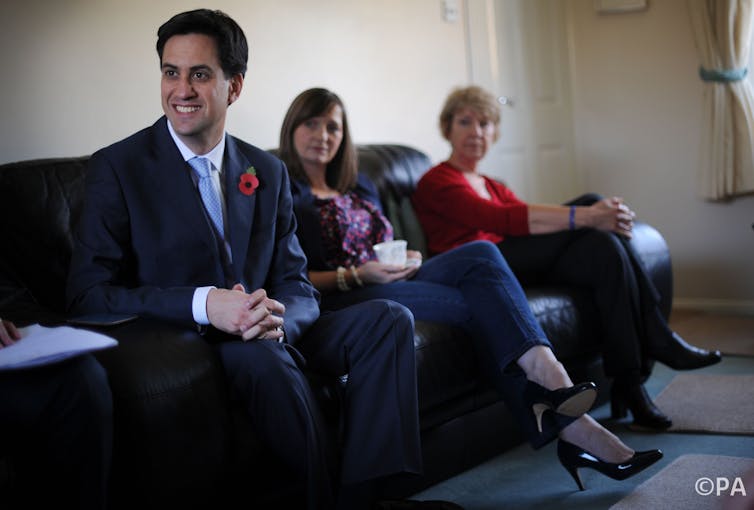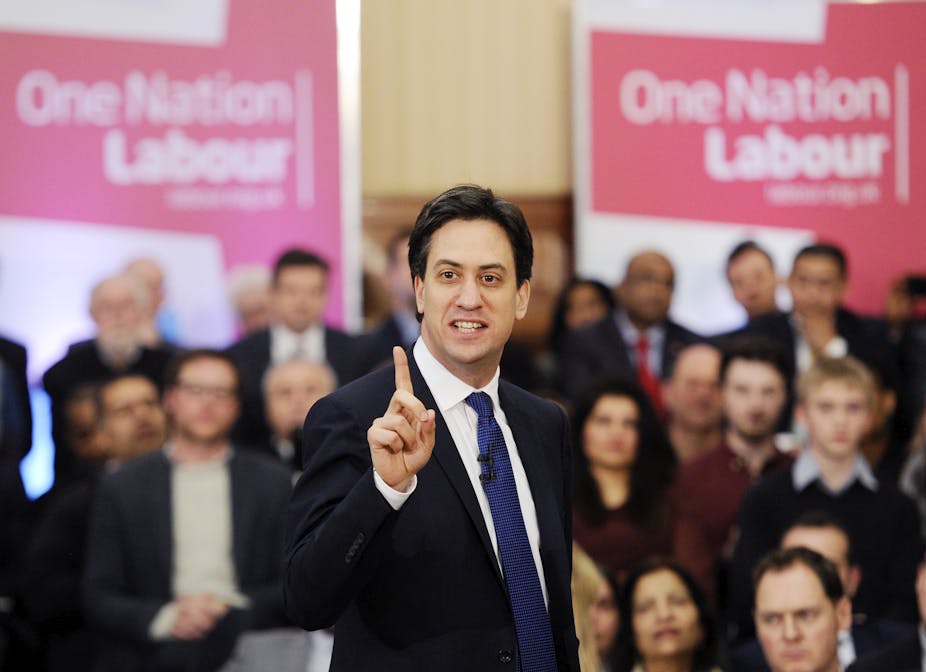Ed Miliband’s promise to hold four million doorstep chats with voters during this year’s electoral campaign was met with derision by some commentators. The Guardian mockingly calculated that the Labour Party will be having 2,049.1 conversations per minute from now until polling day.
But jokes aside, Miliband’s electoral strategy doesn’t just make economic sense for a party as cash-strapped as Labour – it makes political sense too.
Trailblazers
Electoral campaigns based on grass-roots activism (and lots of doorstep conversations) on the concrete issues that matter to voters are behind the meteoric rise of political parties such as Syriza in Greece and Podemos in Spain.
It matters a great deal that these two political parties are unabashedly anti-austerity (in contrast with Labour), but it also matters that their popularity is due in large part to their strategies: Podemos’s rather unglamorous, and most of the time invisible local campaigns to fight home evictions, or Syriza’s “solidarity kitchens” and ad-hoc medical centres.
It matters too that these parties have managed to mobilise thousands of voters – in particular of young voters – who were attracted to their causes, their innovative methods (especially internet activism) and democratic decision-making structures which result in a very different way of doing politics.
In less than a year, Podemos mobilised 110,000 active members, and it currently attracts 23% of Spanish voters’ support, but for most of 2014, it was the most popular party in Spain. In Greece, Syriza has been around for longer, and now leads the opinion polls, attracting 30% of voting intentions.
Both Podemos and Syriza are often portrayed as populist far-left parties, but that’s misleading. Podemos emerged from the activism of the Indignados and the Italian Five Star Movement, but now it’s more keen on defending social democratic and Keynesian alternatives to austerity policies.
Syriza, on the other hand, has its roots in more traditional radical left politics, but in the past four years it has ditched doctrinal debates about the evils of capitalism and embraced Keynesian solutions to deal with Greece’s debt and social crisis.
In a way, these parties are the new social democratic voices of their countries, ready to replace the more traditional but ideologically compromised left-wing forebears.
Miliband in motion
Miliband doesn’t specifically endorse the political radicalism of Podemos and Syriza, but he has long recognised the potential of using “movement politics” to advance progressive causes.
The number of Labour members has dramatically declined, and Miliband believes that a key way to get new blood into the party is to support community-based initiatives on concrete issues that matter to local people. In particular, he long ago saw the potential of attracting young activists who are interested in politics, but who do not connect with the hierarchical and bureaucratic culture of traditional political parties.
But movement politics is more than an electoral tool for him; it’s also a fundamental component of his political programme. In many ways, this is the 21st-century version of the Guild Socialism that so many around him would like to rehabilitate – an alternative to both the market fundamentalism of the Conservatives and the nanny-statism often associated with the Labour Party.

And since he became Labour leader, Miliband has worked hard to put movement politics at the heart of the party’s culture. He ennobled Maurice Glasman, a great believer (and participant) in grass-roots democracy, and he hired Arnie Graf, the American veteran campaigner who had mentored Barack Obama in his early days as a young activist in Chicago, to inject the Labour party with the movement politics spirit.
Suspicious minds
Graf accepted Miliband’s challenge, and proposed new campaign methods that relied on grass-roots campaigns on concrete issues such as pay-day lenders, the living wage, energy prices, zero-hours contracts, saving the local library, and so on. Several Labour backbenchers and candidates – especially the younger crop of MPs – embraced the techniques, and they’ve been campaigning on issues that matter to local people and have supported the grass-roots activism of their constituencies.
The results are difficult to quantify, though many Labour MPs claim that this campaigning style has started to attract new Labour supporters and activists.
But there is a significant swathe of the Labour firmament that rejects movement politics altogether, and thinks some of Graf’s campaigning themes far too anti-business. Some Labour figures felt his ideas were not at all suited to the hierarchical structures and decision-making processes of a party like Labour.
Others, Douglas Alexander among them, were unimpressed by Graf’s methods and their financial cost to the party, and apparently succeeded in side-lining Graf altogether.
But even if Graf has been marginalised by Labour grandees, he’s clearly already left an imprint in Labour politics. Miliband’s electoral campaign kick-off speech on January 5 showed that movement politics is very much alive in the party. Commentators may sneer, but chats with voters about bread and butter issues (and away from Westminster’s political point-scoring) may be the secret to transforming Labour’s chances on May 7.

